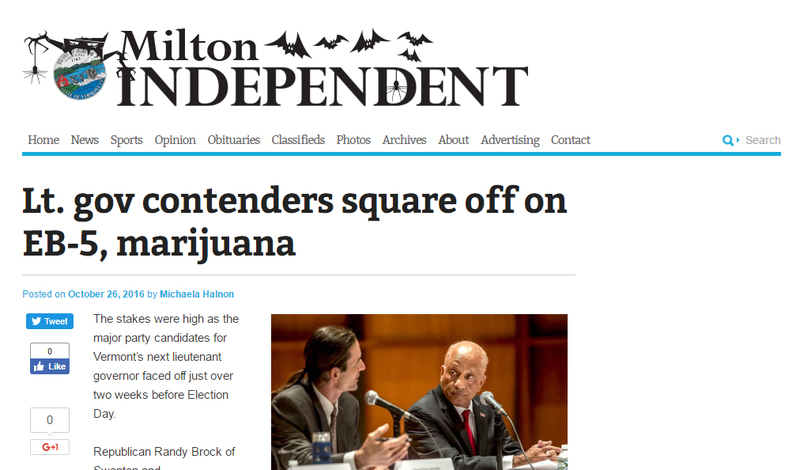Sue Minter and Phil Scott discussed everything from tax reform to renewable energy at last Sunday’s Debate Sunday hosted by the Vermont Press Association at St. Michael’s College.
The stakes were high as the major party candidates for Vermont’s next lieutenant governor faced off just over two weeks before Election Day.
Republican Randy Brock of Swanton and Progressive/Democrat David Zuckerman of Hinesburg remained unruffled throughout their debate
The stakes were high as the major party candidates for Vermont’s next lieutenant governor faced off just over two weeks before Election Day.
Republican Randy Brock of Swanton and Progressive/Democrat David Zuckerman of Hinesburg remained unruffled throughout their debate last Sunday, despite laying out key policy differences in several controversial arenas.
Boots Wardinski, a Liberty Union Party candidate, was invited but did not attend the debate.
An early question about college affordability quickly pivoted to marijuana legalization after Zuckerman, a Chittenden County senator, suggested using some revenue generated through a state-sponsored cannabis industry to bankroll higher education trust funds.
Zuckerman sees the irony in funding education with a restricted substance, but thought it would allow the government to stop the “underground system” of drug use and “address it in an honest way.”
“Many people who are younger get into drugs and alcohol when they don’t see a path to a future,” Zuckerman said. “If we make higher education an affordable option, we erase that deterrent and instead create hope.”
Brock flatly disagreed. “This is not the time to legalize,” he said, going on to challenge Zuckerman’s revenue calculations.
The former state auditor also said legalization would directly contradict the federal government and warned “the stroke of a bureaucrat’s pen” could wipe out any statewide industry.
“Essentially, I see that as pot smoke and mirrors,” Brock said. “It is not something you can build an economy on.”
Later, both Zuckerman and Brock voiced support for accepting refugees into Vermont, saying it would increase diversity.
Brock connected the question to the EB-5 immigrant investment program, the subject of a fraud investigation at Jay Peak.
“Wouldn’t it be nice to invite EB-5 investors, instead of locating in California and New York, to become Vermont residents?” Brock asked. “Wouldn’t it be great to have a few immigrants that are actually wealthy?”
Zuckerman took issue with that, saying, “I would never promote a wealth test for people to move into Vermont. I’m not really a fan of giving folks who have huge sums of money an advantage over others in immigrating into this country.”
Brock later clarified he would not support any preferential treatment for well-off immigrants.
“I don’t think there’s anything wrong with having some wealthy immigrants,” Zuckerman said. “I just don’t think they should get a free card to the front of the line.”
On healthcare, the candidates agreed: Both said Vermont Health Connect needs serious amending or abandoning.
Zuckerman suggested a “less complex” system, like universal primary care or Doctor Dinosaur 2.0. Brock said the state should head to the federal exchange, insulating itself from potentially costly changes likely to crop up along the way.
“We have this tendency in Vermont to say we’re going to be first in the nation in doing something,” Brock said. “Well, I don’t want to be first in the nation to have a heart transplant. I want to look at what’s working elsewhere.”
Zuckerman said he thought Vermonters were proud to be first to support civil rights and marriage equality issues, among others.
“I’m OK with us being first and leading the way,” Zuckerman said. “We are small and we’re nimble, and we can make corrections when we’ve made mistakes.”
The candidates were later asked to imagine how they would spend their days in office, especially in a position known for its relative flexibility and embedded freedom.
As a Progressive and a Republican, Zuckerman and Brock both said they knew what it was like to be a political minority in Vermont and would work to integrate a variety of voices while presiding over the Senate.
When not in session, Zuckerman said he planned to take a page from Sen. Bernie Sanders’ book, helping ordinary Vermonters influence the political process. He said he hoped to travel Vermont and bring the statehouse to the people.
Brock also promised to be an ambassador, but said he’d focus on reaching out to people who can create new jobs and enterprises. He promised to be a set of eyes and ears for government.
As Zuckerman pointed out, however, the future lieutenant governor’s biggest responsibility is the potential call to step into the state’s highest office. That’s happened five times in Vermont history.
http://www.miltonindependent.com/lt-gov-contenders-square-off-on-eb-5-marijuana/
Mentions
States
- Vermont
Videos





Subscribe for News
Site Digest
Join Professionals on EB5Projects.com →
Securities Disclaimer
This website is for informational purposes only and does not constitute an offer or solicitation to sell shares or securities. Any such offer or solicitation will be made only by means of an investment's confidential Offering Memorandum and in accordance with the terms of all applicable securities and other laws. This website does not constitute or form part of, and should not be construed as, any offer for sale or subscription of, or any invitation to offer to buy or subscribe for, any securities, nor should it or any part of it form the basis of, or be relied on in any connection with, any contract or commitment whatsoever. EB5Projects.com LLC and its affiliates expressly disclaim any and all responsibility for any direct or consequential loss or damage of any kind whatsoever arising directly or indirectly from: (i) reliance on any information contained in the website, (ii) any error, omission or inaccuracy in any such information or (iii) any action resulting therefrom.



